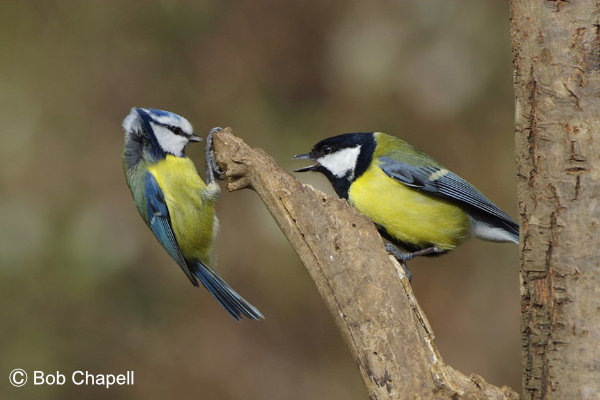Jeanne Legros PhD thesis
 Does urbanization impact interspecific competition ? Acoustic and behavioral responses in blue and great tits
Does urbanization impact interspecific competition ? Acoustic and behavioral responses in blue and great tits
Started in october 2023
Funding: French ministry of research
Supervisors: Paul Alibert and Claire Dufour
Abstract
Understanding the mechanisms of coexistence between species is not only one of the pilar of Ecology but has also become a major societal issue due to the acceleration of the biodiversity decline during the Anthropocene. While the recent advent of Urban Ecology highlights the effect of new anthropogenic constraints on the composition and structuring of communities or even the dynamics of populations and individual characteristics, taking into account the behavioral mechanisms of the coexistence between ecologically similar species is still a neglected aspect of the discipline that needs to be explored. In an unprecedented way, this thesis will specifically evaluate the impact of acoustic pollution due to urban anthropogenic activities on the competition between Great tit (Parus major) and Blue tit (Cyanistes caeruleus) and the repercussions this has on communication (the song) and territorial responses in these two species. The thesis will aim to i) test the characteristics of the song of the two species along gradients of urbanization and interspecific competition in France, ii) determine the effect of these changes in communication on territorial responses and iii) address the processe(s) of song variations by estimating the heritability of this trait. Therefore, this empirical field study will test the effect of acoustic pollution on the fine mechanisms of coexistence, an innovative aspect of Urban Ecology.
Keywords
Urbanization, Competition, Character displacement, Acoustic response, Behavior
Advisory panel
Claire Doutrelant (CEFE, Montpellier)
Thierry Lengagne (LEHNA, Lyon)
- extrait:
- lien_externe:
- titre:
- L'urbanisation impacte-t-elle la compétition interspécifique ? Réponses acoustiques et comportementales chez la mésange bleue et la mésange charbonnière
- date_de_debut_these:
- octobre 2023
- nom:
- Legros
- date_de_debut_these_numerique:
- 202310
- kc_data:
- a:8:{i:0;s:0:"";s:4:"mode";s:0:"";s:3:"css";s:0:"";s:9:"max_width";s:0:"";s:7:"classes";s:0:"";s:9:"thumbnail";s:0:"";s:9:"collapsed";s:0:"";s:9:"optimized";s:0:"";}
- kc_raw_content:
 Does urbanization impact interspecific competition ? Acoustic and behavioral responses in blue and great tits
Does urbanization impact interspecific competition ? Acoustic and behavioral responses in blue and great titsStarted in october 2023
Funding: French ministry of research
Supervisors: Paul Alibert and Claire Dufour
Abstract
Understanding the mechanisms of coexistence between species is not only one of the pilar of Ecology but has also become a major societal issue due to the acceleration of the biodiversity decline during the Anthropocene. While the recent advent of Urban Ecology highlights the effect of new anthropogenic constraints on the composition and structuring of communities or even the dynamics of populations and individual characteristics, taking into account the behavioral mechanisms of the coexistence between ecologically similar species is still a neglected aspect of the discipline that needs to be explored. In an unprecedented way, this thesis will specifically evaluate the impact of acoustic pollution due to urban anthropogenic activities on the competition between Great tit (Parus major) and Blue tit (Cyanistes caeruleus) and the repercussions this has on communication (the song) and territorial responses in these two species. The thesis will aim to i) test the characteristics of the song of the two species along gradients of urbanization and interspecific competition in France, ii) determine the effect of these changes in communication on territorial responses and iii) address the processe(s) of song variations by estimating the heritability of this trait. Therefore, this empirical field study will test the effect of acoustic pollution on the fine mechanisms of coexistence, an innovative aspect of Urban Ecology.
Keywords
Urbanization, Competition, Character displacement, Acoustic response, Behavior
Advisory panel
Claire Doutrelant (CEFE, Montpellier)
Thierry Lengagne (LEHNA, Lyon)
